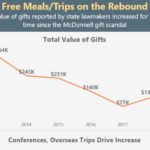
It is always important to listen for the dogs that don’t bark, and the 2019 General Assembly showed neither bark nor bite on issues of money, politics and ethics. Everything in Virginia is just fine with the legislators themselves, apparently.
So fine that the only significant bill involving the Virginia Conflict of Interests and Ethics Advisory Council eliminated its quarterly meetings and left it to meet only on call. The only significant bill dealing with campaign finances to pass involves reporting requirements for elections in Virginia towns. We head into the decisive 2019 General Assembly races with the same rules that have served so well for so long.
Reports in the Monday Richmond Times-Dispatch and on the Virginia Public Access Project focus on the most recent public reports of gifts, trips and meals accepted by those legislators. The headlines note a slight uptick in benefit values since the previous year, but as the VPAP chart shows, the amount is still one third of the amount five years before. Many legislators remain reluctant to show up on these reports.
But what does it mean if they don’t? The loophole described by Bacon’s Rebellion last year remains in place. It is still a common practice for lobbying firms to bundle dinner costs to multiple clients, allowing them to claim that each client spent less than $50 per guest and a dinner which in aggregate cost far more need not be reported with names.
So, while 45 of the 140 legislators report zero for the value of gifts accepted, they might have attended numerous high-dollar soirees, complete with the best from the bar, and accepted a pile of $49 gifts. Likewise, those reporting totals under $100 might have taken far more but simply don’t have to tell you.
The biggest item reported was a trip to South Korea taken by Delegate Tim Hugo, R-Fairfax County, and in most other cases it is travel, lodging and meals provided for various conferences that account for the 25 legislators reporting more than $1,000 in benefits. Acceptance of those trips, I’m sure, was blessed by that aforementioned advisory council, which has that job.
The downside of the public fascination and legislative angst over this is that social events can be a useful part of the process. If constituents are in town for the Virginia Chamber of Commerce reception or some other industry gathering, the legislator should go and mingle and listen. One popular event, the annual Agribusiness Dinner, with its reported $69 per person cost, was once again the only thing reported by many legislators. Shame on any voter or political opponent who thinks less of them for it.
But there is plenty to be worried about in the way Virginia operates.
- The total cost of any and all social events hosting legislators and staff needs to be reported, ending the game of dividing the cost by the number of clients splitting the bill. Lobbyist A buys Legislator B anything more than a cup of coffee, it gets reported.
- The $50 limit can cover a multitude of sins along with much harmless behavior and needs to be revisited.
- We know which legislators are going to these state and national conferences, and they run the ideological spectrum, but do we know which lobbyists or lobbying principals are also attending? If the fees sponsors pay to the conference make it possible for the legislator to attend gratis, shouldn’t a lobbyist spending those sponsorship dollars also report those? Not just any direct entertainment costs? Trust me, the legislator eventually knows who paid the freight.
- Charitable giving by entities which lobby the General Assembly, sometimes solicited by the legislators themselves.
- The rare but real problem of campaign dollars being spent for personal benefit, a loophole which is likely to provide the next big scandal since the embarrassing gift revelations about former Governor Bob McDonnell and his family.
- Dark money in its myriad forms, again from all political directions. Both parties enjoy the lack of disclosure and there is an understanding in play.
- The really big one, Virginia’s loose definition of what constitutes lobbying, compared to the far more detailed rules imposed by Internal Revenue Service. It’s time for Virginia to sync with that.
A discussion over coffee, lunch or even dinner in and of itself corrupts nobody. But lobbyists or private citizens who can afford to do it, and get their invitations accepted, enjoy an advantage over lobbyists or private citizens who cannot afford it or find the practice distasteful. If it didn’t help, they wouldn’t do it. If it all had to be reported, they might do it less.

Leave a Reply
You must be logged in to post a comment.